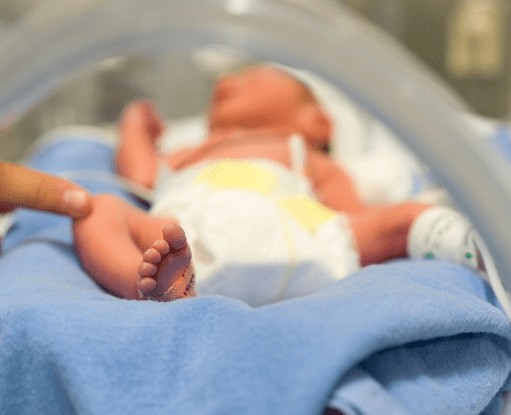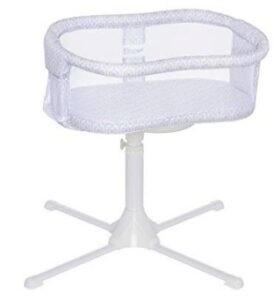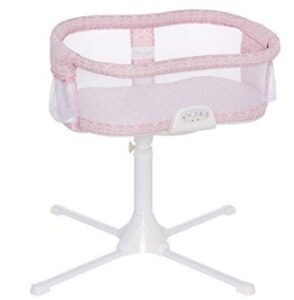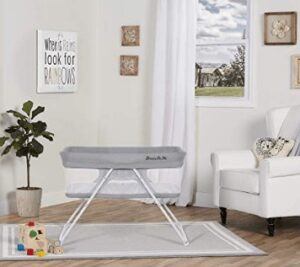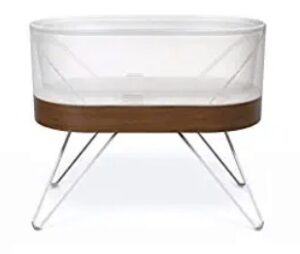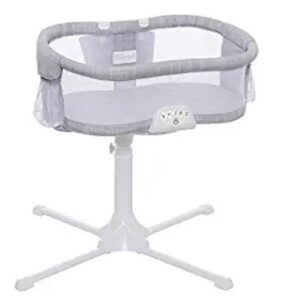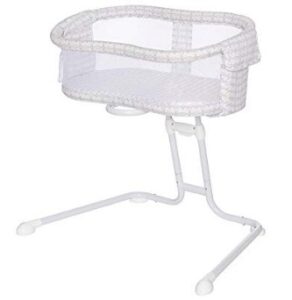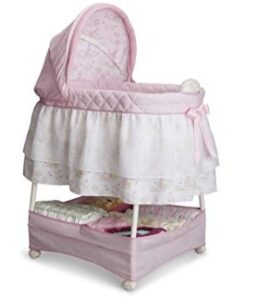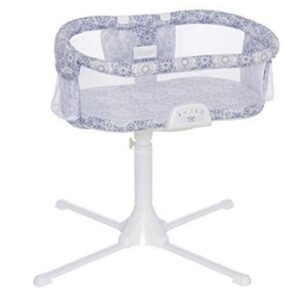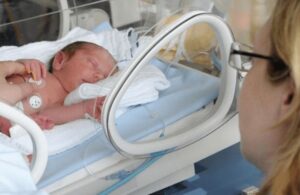Premature babies tend to be far weaker than normal babies, and need special care, no matter for sleeping modes or eating. Parents of premature babies worry about tons of things in taking care of them, however, there is no need to be anxious. To some extent, premature babies can grow as healthy as other infants as long as you are raising them scientifically. To solve all your problems, we made this best bassinet for preemies reviews to introduce the necessary gears for you, and also collect all the problems from preemie parents.
Go on reading and all your questions will be answered here!
Table of Contents
What Is the Best Bassinet for Preemies?
Quick Pick on Top 8 Best Bassinets for Preemies
Best Bassinets For Preemies Reviews
#1. Best Pick – HALO Swivel Sleeper Bassinet
Features:
- Swivel 360 degrees for convenient use
- 36 inches overall height
- Perfect for taking care of babies of preemies
- Height adjustable
- Space saving base
#2. Perfect for Baby Girl – Halo Swivel Bassinet Sleeper
Features:
- Rotate and swivel 360 degrees
- 2 levels of vibrations and 3 sounds
- 30 minutes of auto-shutoff
- Polyester material for easily wipe
- Fits most bed size and height
- Mesh side to better communication
#3. Best Portable Bassinet – Dream On Me Meghan Bassinet
Features:
- Easy to set up in a few seconds
- Quickly fold up for storage
- Mesh side for fresh air circulation
- Perfect for travel use
- Simple to clean and move the mattress
- Compact shape
#4. Small Bassinet for Preemies – SNOO Smart Sleeper
Features:
- Easy to customize the height
- Soft and comfortable mattress
- Include preemie mode and warning option to easily transfer to the crib
- Mesh side to take care of babies in sleep
#5. Best Swivel Sleeper Bassinet – HALO Luxe Plus Bassinet
Features:
- Equipped with floor light for a clear vision at night
- Rotate 360 degrees for easy in and out of bed
- Stable 4-point base to fit bed height
- 3 soothing sounds and 3 lullabies
- 100% polyester material
- 2 large storage pocket
#6. Best Space Saver – HALO Gliding Bassinet
Features:
- Lower sidewall to get near to your babies
- The wall can be locked in an upright position
- Equipped with gliding disc to prevent floor from scratching
- Stable 4-point base with different height
- 100% polyester materials
- Easy to wipe clean
#7. Best Bassinet with Large Storage Bag – Delta Children Gliding Bassinet
Features:
- Calming nightlight with soothing sounds
- Various speed control on vibrations
- Relaxing gliding mode to effectively soothe babies
- Super large storage bags for diapers
- Adjustable and removable canopy
- Passed JPMA certification
#8. Best Bassinet for Baby Boy – Halo Bassinet Swivel Sleeper
Features:
- Rotate and swivel 360 degrees
- 4-point base to fit multiple beds height
- Polyester materials
- Waterproof and easy-clean mattress
- 2 storage bags for diapers
What is Premature for a Baby?
Although babies can be born before the given due date, they are not considered to be premature unless they are born more than three weeks before full term. This means that a premature baby would be born before the 37th week of the pregnancy.
Any time before full term is considered to be premature, but after the 37th week of pregnancy, there is far less risk of the baby developing learning disorders, or their cognitive functions being lessened.
There are four main types of premature birth: late preterm, moderately preterm, very preterm, and extremely preterm. The earlier they are born, the more susceptible they are to health concerns and learning disabilities, as well as being malnourished and needing extra care and attention. For the most part, premature babies do survive but they need to be under constant care and attention in order to make it through those key weeks after birth.
When Can a Premature Baby Survive?
The closer that a premature baby is born to full term, the better their chances are of survival and living a normal, healthy life. While most premature babies do pull through and survive (albeit, in some cases with extensive medical care and attention), if a premature baby is born younger than 22 weeks, the chances of survival are very slim.
There are other factoring elements that come into play when a premature baby is born other than how close or not they were too full terms, such as weight, gender, the mother’s health, and if there were any other complications during the pregnancy.
The first few weeks, and in some cases months, are pivotal to the newborn premature baby’s rate of survival, and with the appropriate care and medical attention, a lot of premature babies will pull through and lead a happy and healthy adult life. In some cases, there are instances of premature babies developing learning disabilities but that does not mean that just because your baby is premature that they will develop a disorder, or be any less intelligent than a baby that was born at full term.
How Does Premature Birth Affect the Baby?
Because premature babies are born before they have had the time to develop completely, they often can have medical issues. These health concerns can vary depending on genetics, and how premature the baby was born. Generally speaking, the earlier that a baby was born and the more premature they are the higher the risk of health concerns they will have.
Common issues like breathing problems, heart problems, and brain problems can develop due to premature birth, and the weeks after a premature baby is born is key in knowing what issues are present. While most of these medical issues are minimal and will eventually fade, in some cases it will last with them into their adulthood.
Health issues and concerns that can affect premature babies can include:
Breathing problems
Because their respiratory system has not fully developed, they may have a harder time breathing and may even need to be on breathing machines after birth for a period of time as deemed necessary by your doctor.
Blood Problems
Anemia and Jaundice are common health issues that can affect newly born premature babies, and although all babies experience a decrease in red blood cells after birth, this is intensified in newborn babies.
Brain Problems
Premature babies have not finished developing their cerebral cortex, and other aspects of their brains have not developed fully. While the brain does continue to develop after birth, a baby who is extremely premature may suffer mental capacity issues down the road.
Sleep Awareness for Preemie Parents
While there is relief in bringing your premature baby home from intensive care, it can also be scary at first knowing that you don’t have the support of breathing machines and nurses monitoring your baby around the clock. This can be a nerve-racking and scary time for any parent of a premature baby, but especially new parents.
It is important to remember that premature baby won’t be discharged from intensive care unless the doctor has deemed it alright to do so, and not without your baby showing that they are capable of breathing on their own for a few nights before leaving the hospital.
The first few nights you may be restless, but every night will get easier moving forward. The most important aspects of creating a safe and ideal sleeping environment for your newborn baby is positioning and what is in the crib with them. As relates to positioning, you should lay your premature baby on its back when you are putting them down for the night, or to take a nap and avoid having anything in the crib with them. If you are worried about them being warm enough when they are asleep, having them in a thick sleeping onesie will be enough to keep them warm throughout the night.
- The 10 Best Bedside Bassinets Reviews for Newborn Infant Babies 2024
- The 10 Best Co Sleeper Bassinets For Infant Health
- The 10 Best Cradles Bassinets Reviews with Portable and Rocking Design
- 20+ Best Bassinet Stroller Combo Reviews for Infant and Toddler Use
- The 11 Best Gliding Bassinets Reviews with Music and Vibration
Best Premature Bassinets
How to Help Preemies Get Their Sleep in Gear
Positioning for helping your premature baby to sleep soundly is vitally important, and you should refrain from having them sleep with you in your bed, on the couch, or in a chair. It is important that when they are sleeping, they are on their back to avoid SIDS (sudden infant death syndrome) and if they are sleeping with you, even for a nap, it is possible that they will roll over on their side or stomach.
Sometimes it is common for premature babies to suffer from reflux, especially when trying to sleep. If that is the case, you can prop up their head to slightly elevate it when they are sleeping in order to align their bodies in such a way that will help to avoid them having reflux when they are trying to sleep.
There are sleeping aids that you can use in order to wedge your premature baby up slightly while they are sleeping; these generally come with fabric straps so that you can avoid your baby from rolling over on their side or stomach while they are propped up this way.
Having a routine set in place for both bedtime and naptime will also help them to realize when they are about to sleep; this can include having their sleeping environment dark enough to allow for a restful sleep, without keeping it too dark to avoid making them feel like they are alone.
For the first 6 weeks, it may be easier for both them and yourself if you set the crib by your bed; although make sure to avoid having them sleep with you in the bed, as this causes issues with making sure they stay on their back, as well as not establishing the proper routine for sleep.
Buyers Guide on the Best Bassinet for Preemies
Bassinets are a great option for a newborn premature baby, as they are a good side to prevent them from rolling around too much, which will keep them sleeping on their backs. They are small enough that you won’t forget to add anything that your newborn can choke on into their sleeping area, and are elevated so that you can easily check on them during the night.
Space & material
Additionally, they take up far less space than a crib would so even in tighter bedrooms, you can have your newborn sleeping next to your bed in their bassinet, which will make checking in on them and feeding them much easier. Bassinets are generally constructed of a bed frame made of wood, metal, or tubing that has wheels and legs on the bottom, making it easy to assemble and take with you wherever you need.
Canopy design
Some bassinets will have a fold-down canopy that enables you to shade your baby from overhead lights, or the sun if you choose to use outside. When looking to buy a bassinet, some come with storage underneath to store diapers, wipes, creams, and other essentials for taking care of your baby.
Cradle and bassinet combo
Some bassinets can be changed into a cradle that allows you to rock your baby gently to sleep, which many have found to be especially beneficial to newborn premature babies. Another thing to look out for when purchasing a bassinet is the ability to carry it around with you.
Wheels help to move around
Although most come with wheels making it easy to roll from room to room, you will want to look for one that is easily collapsible and allows you to carry it to other locations, such as the sitter or the local church. Some bassinets do come with toys, and although you want to avoid having anything inside a bassinet or crib that your newborn can get into, having a mobile above them is perfectly safe and may help ease them into a restful sleep.
Based on the baby’s needs
There are many different styles of bassinets on the market, but for the most part, the basic principle remains the same and choosing one comes down to your personal preference, and what you think is best for your newborn. A lot of bassinets are decorated with frilly fabric around the top or bottom while keeping the sleeping area fairly sparse.
Safety issues
These frills and pleated fabrics pose no harm to your child, and they may find comfort in touching and feeling them, as we know babies are inquisitive by nature and this act generally is soothing to them. The canopy that comes with the bassinet is great for when you are working and need to shield your baby’s eyes from the overhead light, or just want to provide some extra comfort to your newborn.
Sturdiness
When looking for a bassinet, the most important thing to look out for is sturdiness; you will want to make sure that the legs are properly in place, and that the wheels lock in order to avoid moving the bassinet on accident. In addition, if the frame of the bassinet collapses for storage, you will want to ensure that you are able to lock the frame in place while in use. The mattress should be firm and fit snugly so that there is no space in-between the frame and the mattress.
Tips for Making Sleep Time Easier on Preemie Babies
Bedtime is difficult for any baby, and that is especially true for premature babies, which can sleep for up to 22 hours a day, but in short, bursts, as they need to feed more than full-term babies. Having a routine established for bed will help to signal to them when it is time to sleep.
In addition, it is good to limit artificial light before it is time for bed and allowing natural light to come into the room when they are awake. Taking a walk outside with your premature baby would also be good to expose them to natural light (just make sure to shade them from the direct rays of the sun). Holding your baby and allowing skin-to-skin contact will help to soothe and relax them before bed, and this is especially true for a fussy baby who doesn’t feel good or is overly tired.
- The 10 Best Bassinet For Small Spaces with Compact Foldable Design for Air Plane Use of 2024
- Top 10 Best Bassinet for Breastfeeding Reviews for Co-sleeper and C-section
- How to Prevent and Cure Flat head syndrome in Babies and Adults?
How Can I Settle My Premature Baby to Sleep?
Much like our own bodies, it is important for your premature baby to know the difference between night and day in order to achieve the most restful sleep possible. This can be done by making sure that their sleeping environment is inducive to restful sleep; such as limiting the amount of light (without keeping it too dark) and keeping the environment quiet; although some babies do sleep better with some soothing sounds like white noise.
If you are having trouble getting your premature baby down for the night or to take a nap, skin-to-skin contact with gentle rocking has been shown to help them to feel relaxed and settle down for sleep. Once they do fall asleep, if you need to change their diaper or it is time for a feeding, this should be done quietly to avoid waking them up too much. This will make it easier for them to accept sleep again after they have been awake and will help to soothe them.
Although bedtime only comes once a day, nap time is a great way to establish a sleeping routine that they will come to be accustomed to. Their nap routine should be the same as their normal sleeping routine, as this will signal to them when it is time to sleep.
When Will My Premature Baby Sleep Through the Night?
Depending on how premature your baby was born, it can take several months for them to settle into a regular sleeping pattern and sleep through the night. This is because when it comes to feeding, premature babies will require more breaks in their sleep in order to feed than babies who were born at full term, as they require more nutrition as they did not receive the necessary amount by staying the womb for long enough.
Generally speaking, premature babies will sleep for around an hour and be awake for 20 minutes. This is the sleeping and feeding cycle, which depending on how premature your baby is, can last anywhere between 4-8 months. Because of this unpredictable sleeping pattern, during the first several months, it may be difficult for your premature baby to settle into a normal sleeping routine.
While premature babies may require more sleep than babies who were born at term, their sleep cycles are shorter and they will spend more time in a lighter sleep; being easily awakened. Additionally, they may have started to get used to the lights and sounds of the hospital which is all they knew for their first few weeks after being born. They may take some time to acclimate to their new surroundings before they realize that this is their new home.
Are Premature Babies Smarter?
Although there are a lot of factors that go into the overall intelligence of an individual, it should be noted that the fetus has its brain start to fully develop in the last few weeks of the pregnancy, and as a result, premature babies may encounter issues as relates to their cognitive function and overall intelligence.
To get scientific for a second, the outer layer of the brain is called the “cerebral cortex”, and the growth of this part of the brain may be interrupted by a premature birth. That is not to say that premature babies will not be able to develop this section of the brain, or that they are not as intelligent as babies who are born full-term, but it can have an impact on them.
Additionally, it should be noted that lower brain volume or density does not mean that a premature baby is born less intelligent, or will struggle with education later on in life; as brain growth will continue after birth, and there is a great opportunity for growth in premature babies.
Can Premature Babies Live a Normal Life?
While the first several weeks and in some cases months are pivotal to determining how far behind a premature baby’s development will be, in most cases, they are absolutely capable of living a normal and happy life. In extreme cases, the loss of development that occurs while in the womb may translate into their adult life, but for the most part, they are able to continue developing their cognitive functions and vital organs after birth.
Although premature babies are at a greater risk for developing long-term disabilities due to cognitive functions not fully developing, they can still live a normal life even if a disability is present. After birth, it is key to cater to your premature baby in order to ease their new beginning in life, as well as to aid them in developing their key functions. This can include skin-to-skin contact, breathing aids, and a nutrition program.
Best Premature Baby Products
What Are the Main Causes of Premature Birth?
There are several causes of premature birth. Here are some of the common causes of premature birth:
Poor nutrition
If you are exposed to poor nutrition after and before pregnancy, then there are high chances you will develop premature birth. It is necessary for parents to adhere to the right nutrition after and before pregnancy so that they can reduce the risk of developing premature birth.
Smoking and too much alcohol during pregnancy
It is advised to avoid alcohol during pregnancy. If you will keep on drinking too much alcohol and smoking cigarettes during pregnancy, then you increase the chances of developing premature birth. Parents are advised to avoid illegal drugs and alcohol during and after pregnancy to avoid the risk of developing premature birth.
Reproductive system infections
There are certain infections that are known to cause premature birth. For example, you may be exposed to urinary tract infection and amniotic fluid infections which can expose you to the risk of developing premature birth. It is necessary to look for ways of avoiding any form of infection so that you can reduce chances where you can end up developing premature birth.
Abnormal uterus
There are some mothers who have a uterus with defects. An abnormal uterus can be the cause of premature birth. It is advisable for the health care professionals to carry out tests and advise you about the pregnancy.
What Is a Good Weight For a Premature Baby?
A premature baby with 5 propounds has a higher chance of surviving. When the baby is born before full-term pregnancy, most of his body parts have not developed fully. The baby will tend to have a low weight. It is among the common signs which the professional will take into consideration to diagnose you with premature birth.
Do Premature Babies Die Earlier?
There are high chances that premature babies will less likely survive when compared to full-term babies. It is not a must for the preterm babies to die earlier. Nowadays technology has evolved to make it possible for the health care providers to offer the best health care services which increase the chances of the babies surviving drastically.
Do Preemies Need to Be Held More?
Yes, you need to offer extra care to your premature baby. The baby has not developed fully which makes it necessary to take extra care. Remember the baby will need necessary warmth among other extra care so that he can survive. If you are a mother with a premature baby, then you should be prepared to take extra care.
What Are the Warning Signs of Premature Labor?
Several uterine contractions in an hour
If you experience more than 5 uterine contractions in an hour, then it is a sign you are about to experience premature birth.
Watery fluid leak
When you experience a watery leak from your private parts, then there is a chance your water has broken and it is an onset of premature birth. You need to seek medical attention immediately you notice the changes.
Menstrual like cramps on your lower abdomen
There are times you can experience menstrual-like cramps on your lower abdomen. In such a case, then there are high chances you have developed premature birth. Other factors you need to check out include an increase in vaginal discharge, pelvic pressure which feels like pushing down among other issues.
Can Stress Cause Premature?
Yes. Stress is among the factors which can contribute towards premature birth. You need to keep stress levels at check to avoid the risk of developing premature birth. When your body is stressed, there are high chances it will not function normally. To avoid cases where you will be exposed to health issues, it is necessary to ensure you look for ways you can control the stress.
- 15 Best Newborn Bassinets with Rocking and Vibrating for Baby Boy and Girl Reviews
- The 8 Best Rotating Baby Swing Reviews & Buying Guides 【2020 Updated】
- The Best Bouncer for Colic Baby Buying Guides & Reviews 2024
How Your Premature Baby Acts
Crying softly
The premature baby has not developed fully. You may hear her crying softly. In some cases, the baby may have trouble breathing. Premature babies have not developed fully. Some of the organs in the body such as lungs may face challenges when breathing. You will realize the baby will tend to breathe softly.
There are several safety measures the doctors can take if they notice her breathing is not normal. Assistive devices can be applied to help the baby get enough oxygen to allow for her organ development.
Features of the Premature Baby
Small size
A premature baby will tend to be small in size. In some cases, you will notice the head is bigger than other parts of the body. The baby will tend to have fewer fats.
Think skin
With a premature baby, you will tend to have thinner skin. The thin skin will make the baby appear transparent. You can use the blood vessels beneath the skin due to its thin appearance. The skin will appear thin because it will have few fats.
Getting cold too fast
Under normal room temperature, the preterm baby will get too cold. Remember her skin has not developed fully. If you can expose her to room temperature, they will tend to feel too cold. Doctors will place her under an incubator to help her control the temperature.
How Early Is a Premature Baby?
A birth that takes place more than three weeks early is referred to as premature. If you give birth early than 37 weeks of pregnancy, then your birth is termed premature. Special care should be taken to ensure the baby survives.
How Many Pounds Is a Premature Baby?
A premature baby will weigh about 5 pounds. Health care professionals will carry out tests to know the weight of the baby before they can take necessary measures. The baby appears thin when compared to other normal births.
- The Best Bouncer for Colic Baby Buying Guides & Reviews 2024
- The 11 Best Affordable Baby Swings Reviews & Guides 2024
- 3 Best Bluetooth Baby Swing Reviews With App Control & Buying Guides 2024
How Often Should a Premature Baby Poop?
A premature baby will not poop so often. She can take up to two weeks to only poop once. There is no need to worry; a premature baby will feed on breast milk which in most cases it fully absorbed into the body.
How to Care For a Preemie Baby?
Touch the baby
You need to feel the baby most of the time so that you can notice any change in her body. Preterm babies have not developed fully, it is necessary to keep on checking on them so that you can act fast before it is too late. Use a gentle touch or stroking motions and it will be easy for you to know whether it is time to take your baby to the doctor. Preterm babies are fragile and they need close attention so that you can notice any change in her life.
Change her diaper
You need to keep watch of the baby when she needs diaper change. The babies will poop and it is necessary to ensure you change the diaper to avoid cases where urine will accumulate up to levels where she will be exposed to skin rushes. Always ensure you keep the baby clean so that she can develop and enjoy a good sleep.
Bath the baby
The baby should be clean at all times. It is your duty as a parent to participate in cleaning the baby. The water to take your baby’s first bath should be lukewarm. You need to check on the temperature. Too cold water will make your baby uncomfortable. It is upon you to take necessary measures and ensure you have the right water in place so that you can make your baby comfortable.
Take the baby temperature
You need to keep watch of the baby temperature. Her body ashes not fully developed and she may have problems when it comes to regulating temperature. If you can keep watch of the baby temperature, then it will be easy for you to make the baby comfortable at all times. There are special thermometers you can apply to keep watch of the baby temperature.
Best Baby Swing for Premature Babies
Preemie Baby Development Schedule
The schedule of premature baby development comes in several stages. You will have a late preterm between 34 weeks and less than 37 weeks of pregnancy. When you give birth between 32 weeks and 37 weeks of pregnancy, it is referred to as moderately preterm. Very preterm is when you give birth in less than 32 weeks. In the case of extremely preterm, it is where you will give birth when you are less than 25 weeks pregnant.
How Do You Feed a Premature Baby?
When babies are born premature, they are born when her body has not developed fully. The doctors will use a tube through their noses to feed them. The baby will face challenges sucking, breathing and swallowing because her body has not developed to coordinate fully. The baby will be fed through the tubes until she develops to start feeding through breast milk.
How Often Should You Feed a Premature Baby?
You need to feed a premature baby after every 2 1/2 – 4 hours. You need to keep watch of clues when the baby is hungry so that you can start feeding. In most cases, the baby will not cry but will start moving around. If 2 to 3 hours pass after you last fed the baby and she starts making movements, then it is time to feed again. Preterm babies will not cry but the movements will indicate it is time to feed them.
How Can You Prevent Having a Premature Baby?
Get healthy weight
There are several factors that can contribute to having a preterm baby. Being underweight can be among the causes. You need to eat healthily and maintain the right body weight during pregnancy. When you maintain a healthy weight, you will enjoy good health during pregnancy and it will reduce the chances of developing health complications that can interfere with your pregnancy.
Avoid tobacco and alcohol
Research shows that the abuse of drugs and alcohol can increase the chances of having a premature baby. You need to keep off tobacco and alcohol if you are pregnant so that you can reduce the chances of giving birth to a preterm baby.
Get prenatal care early
You need to get prenatal care as early as possible after you suspect you are pregnant. There are cases where the health of your uterus can contribute towards the preterm babies. In such a case, you need to have checked as early as possible so that the nurses can advise accordingly. Some uterine infections can as well contribute towards preterm babies, ensure you check on the sings of infections and get early treatment.
When It’s Time to Go Home For Premature Baby?
It will depend on the type of preterm baby. If you had given birth to preterm baby 4 weeks early, then the baby will stay in the breathing machine until he attains the age of normal birth. For babes born 2 weeks early, you will have to wait for two weeks so that the baby can fully develop after which you will take her home.
How Your Premature Baby Looks
A baby born prematurely will have signs such as a small appearance. The baby will be small because she has not developed fully to attain the right weight. Her skin will be thin. In most cases, you will see her veins and blood. When you feel her hand, you will realize the baby will tend to be fragile. The skin appears shiny and transparent.
Preemie Parents: How to Cope with the Stress
There are several steps you need to take so that you can cope with the stress of giving birth to a premature baby. First, you need to accept the condition and look for ways of dealing with it. Take time to talk to someone about your feelings. Your partner may cope with the different ways, ensure you accept your partner’s way of coping with the issue and it will be easy to deal with the problem.
Potential Health Problems in Premature Infants
You will face several challenges as you take care of a preterm baby. The baby will have several challenges that will affect her life. For example, she will have problems such as anemia, breathing problems, infections or neonatal sepsis, intraventricular hemorrhage, newborn jaundice, necrotizing enterocolitis, patent ductus arteriosus, retinopathy of prematurity among others.
The Long-term Outlook For Premature Infants
When babies are born preterm, they will suffer lifelong effects. Some of the long life effects they can suffer from include cerebral palsy, visual and hearing impairments, mental retardation, poor health and growth problems.
Top 3 Best Bassinets for Preemies

